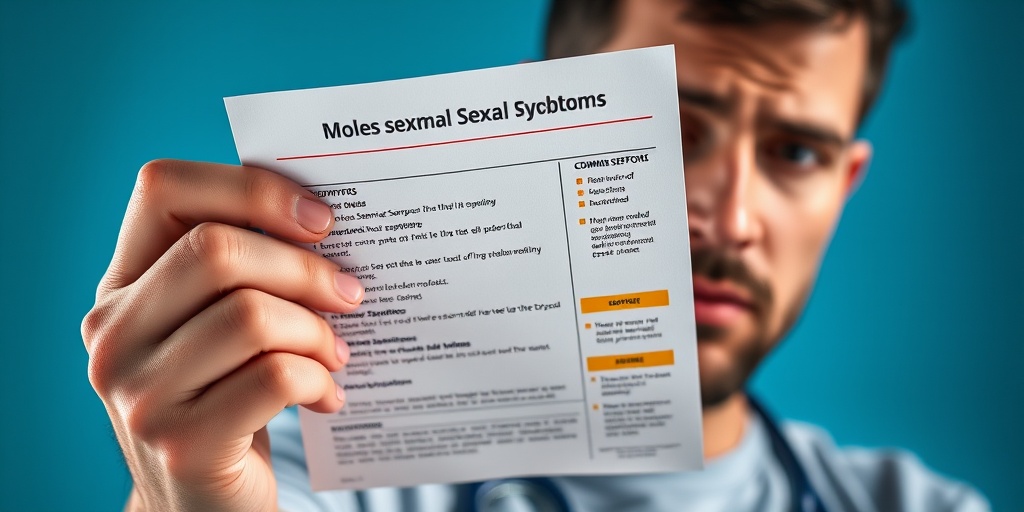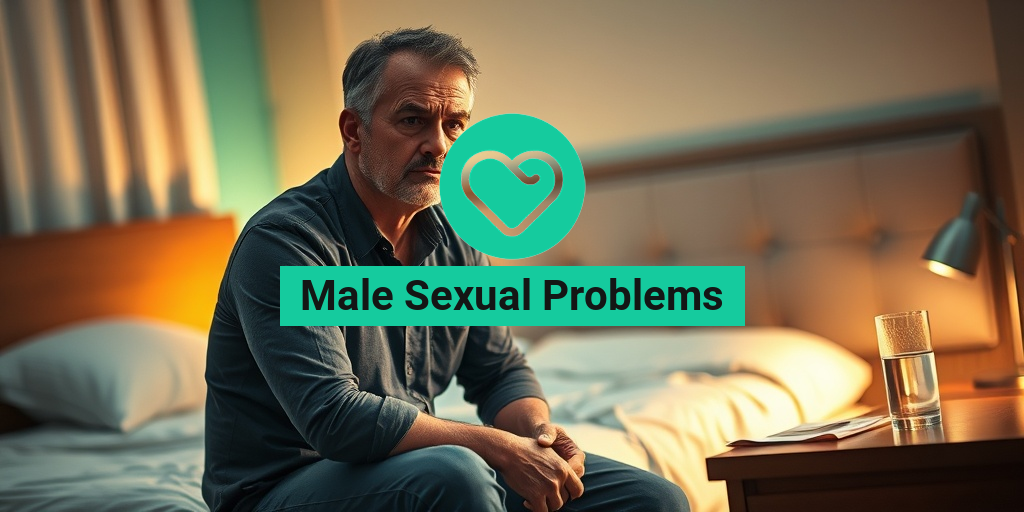What Are Male Sexual Problems?
Male sexual problems encompass a range of issues that can affect a man’s ability to engage in sexual activity or enjoy a fulfilling sexual experience. These problems can arise from various factors, including physical health, psychological well-being, and lifestyle choices. Understanding these issues is crucial for seeking appropriate treatment and support.
Some of the most common male sexual problems include:
- Erectile Dysfunction (ED): The inability to achieve or maintain an erection sufficient for sexual intercourse.
- Premature Ejaculation: Ejaculating sooner than desired during sexual activity, often leading to dissatisfaction for both partners.
- Low Libido: A decreased interest in sexual activity, which can be influenced by hormonal changes, stress, or relationship issues.
- Delayed Ejaculation: Difficulty in reaching orgasm, even with adequate sexual stimulation.
- Peyronie’s Disease: A condition characterized by the development of fibrous scar tissue inside the penis, causing curved, painful erections.
These issues can stem from various underlying causes, including medical conditions like diabetes, heart disease, or hormonal imbalances, as well as psychological factors such as anxiety, depression, or relationship problems. It’s essential to recognize that experiencing sexual problems is common and can happen to any man at different stages of life.
Common Symptoms of Male Sexual Problems
Identifying the symptoms of male sexual problems is the first step toward addressing them. Here are some common symptoms that may indicate a sexual health issue:
Erectile Dysfunction (ED)
Men experiencing ED may notice:
- Difficulty achieving an erection during sexual activity.
- Inability to maintain an erection long enough for satisfactory intercourse.
- Reduced sexual desire or interest in sexual activities.
Premature Ejaculation
Symptoms of premature ejaculation can include:
- Ejaculating within one minute of penetration.
- Feeling distressed or frustrated about the lack of control over ejaculation.
- Difficulty in satisfying a partner due to rapid ejaculation.
Low Libido
Signs of low libido may manifest as:
- Little to no interest in sexual activity.
- Feeling indifferent towards sexual intimacy with a partner.
- Changes in mood or energy levels that affect sexual desire.
Delayed Ejaculation
Men with delayed ejaculation might experience:
- Difficulty reaching orgasm even after prolonged sexual stimulation.
- Frustration or embarrassment during sexual encounters.
Peyronie’s Disease
Symptoms of Peyronie’s disease can include:
- Curvature of the penis during erection.
- Painful erections or discomfort during sexual activity.
- Difficulty achieving erections due to the condition.
If you or someone you know is experiencing any of these symptoms, it’s important to consult a healthcare professional. A doctor specializing in male sexual problems can provide a thorough evaluation and recommend appropriate treatment options. Resources like Yesil Health AI (yesilhealth.com) can also offer evidence-based health answers and guidance on these issues.
Remember, addressing male sexual problems is not just about physical health; it also involves emotional and relational aspects. Seeking help is a sign of strength and can lead to improved sexual health and overall well-being. 🌟

Causes of Male Sexual Dysfunction
Male sexual dysfunction is a complex issue that can stem from various factors, both physical and psychological. Understanding these causes is crucial for effective treatment and management. Here are some of the primary causes:
1. Physical Causes
Physical health plays a significant role in male sexual function. Some common physical causes include:
- Cardiovascular Diseases: Conditions like hypertension and atherosclerosis can impede blood flow, making it difficult to achieve or maintain an erection.
- Diabetes: High blood sugar levels can damage nerves and blood vessels, leading to erectile dysfunction.
- Hormonal Imbalances: Low testosterone levels can significantly affect libido and sexual performance.
- Obesity: Excess weight can lead to hormonal changes and reduced blood flow, contributing to sexual problems.
- Neurological Disorders: Conditions such as Parkinson’s disease and multiple sclerosis can interfere with nerve signals involved in sexual arousal.
2. Psychological Causes
Psychological factors can also play a crucial role in male sexual dysfunction. These may include:
- Stress and Anxiety: Everyday stressors or anxiety about sexual performance can create a cycle of dysfunction.
- Depression: This mental health condition can lead to a decreased interest in sex and overall fatigue.
- Relationship Issues: Problems with a partner, such as lack of communication or unresolved conflicts, can affect sexual desire and performance.
- Past Trauma: Experiences of sexual abuse or trauma can lead to anxiety and fear surrounding sexual activity.
3. Lifestyle Factors
Certain lifestyle choices can also contribute to male sexual problems:
- Substance Abuse: Alcohol and drug use can impair sexual function and libido.
- Smoking: Tobacco use can restrict blood flow and lead to erectile dysfunction.
- Lack of Exercise: A sedentary lifestyle can contribute to obesity and cardiovascular issues, impacting sexual health.
Risk Factors for Male Sexual Issues
Identifying risk factors for male sexual problems can help in prevention and early intervention. Here are some key risk factors to consider:
1. Age
As men age, the likelihood of experiencing sexual dysfunction increases. This is often due to a combination of physical and hormonal changes that occur over time. While it’s not uncommon for older men to face these issues, it’s essential to recognize that sexual health can still be maintained with proper care.
2. Medical Conditions
Several medical conditions can heighten the risk of male sexual dysfunction:
- Diabetes: As mentioned earlier, diabetes can lead to nerve damage and reduced blood flow.
- Heart Disease: Conditions affecting the heart can impact blood circulation, which is vital for sexual function.
- High Blood Pressure: This can lead to vascular damage, affecting erections.
3. Psychological Factors
Men with a history of mental health issues, such as anxiety or depression, are at a higher risk for sexual dysfunction. Addressing these psychological factors through therapy or counseling can be beneficial.
4. Lifestyle Choices
Unhealthy lifestyle choices can significantly increase the risk of male sexual problems:
- Poor Diet: A diet high in processed foods and low in nutrients can lead to obesity and related health issues.
- Physical Inactivity: Regular exercise is crucial for maintaining a healthy weight and cardiovascular health.
- Substance Abuse: Alcohol and drug abuse can lead to long-term sexual health issues.
5. Family History
Genetic predisposition can also play a role. If there is a family history of sexual dysfunction or related health issues, it may increase the risk for individuals.
Understanding the causes and risk factors of male sexual problems is essential for seeking appropriate treatment and support. If you or someone you know is experiencing these issues, consulting a healthcare professional can provide valuable insights and solutions. Remember, addressing these concerns early can lead to better outcomes and improved quality of life. 🌟

Diagnosis of Male Sexual Problems
Understanding male sexual problems is the first step towards effective treatment. These issues can range from erectile dysfunction to premature ejaculation, and they can significantly impact a man’s quality of life. Proper diagnosis is crucial for identifying the underlying causes and determining the best course of action.
Common Symptoms to Look Out For
Men experiencing sexual problems may notice a variety of symptoms, including:
- Erectile Dysfunction: Difficulty achieving or maintaining an erection.
- Premature Ejaculation: Ejaculating sooner than desired during sexual activity.
- Low Libido: A decrease in sexual desire or interest.
- Difficulty with Orgasm: Trouble reaching orgasm or delayed ejaculation.
Consulting a Healthcare Professional
If you are experiencing any of these symptoms, it’s essential to consult a healthcare professional. A male sexual problems doctor can help diagnose the issue through a combination of medical history, physical examinations, and possibly laboratory tests. Here are some steps typically involved in the diagnosis:
- Medical History: Discussing your sexual history, any medications you are taking, and any underlying health conditions.
- Physical Examination: A thorough examination to check for any physical issues that may be contributing to the problem.
- Laboratory Tests: Blood tests may be conducted to check hormone levels, blood sugar, and cholesterol levels.
Psychological Evaluation
In many cases, psychological factors can contribute to male sexual problems. Stress, anxiety, and depression can all play a role. A healthcare provider may recommend a psychological evaluation to assess these factors. This step is crucial, as addressing mental health can significantly improve sexual function.
Treatment Options for Male Sexual Dysfunction
Once a diagnosis is made, various treatment options are available for male sexual dysfunction. The right treatment will depend on the specific issue and its underlying causes.
Medications
Several medications can help treat male sexual problems. Some of the most common include:
- Phosphodiesterase Type 5 Inhibitors: Drugs like Viagra (sildenafil) and Cialis (tadalafil) are often prescribed for erectile dysfunction.
- Hormone Therapy: If low testosterone levels are identified, hormone replacement therapy may be recommended.
Therapy and Counseling
For issues stemming from psychological factors, therapy can be highly effective. Options include:
- Cognitive Behavioral Therapy (CBT): This therapy helps address negative thought patterns that may affect sexual performance.
- Couples Therapy: Working with a partner can improve communication and intimacy, which may alleviate sexual dysfunction.
Lifestyle Changes
Making certain lifestyle changes can also have a positive impact on male sexual health. Consider the following:
- Regular Exercise: Physical activity can improve blood flow and boost testosterone levels.
- Healthy Diet: A balanced diet rich in fruits, vegetables, and whole grains can enhance overall health and sexual function.
- Avoiding Alcohol and Smoking: Reducing or eliminating these substances can improve sexual performance.
Medical Devices
In some cases, medical devices such as vacuum erection devices (VEDs) may be recommended. These devices create a vacuum around the penis, helping to draw blood into the organ and facilitate an erection.
Surgical Options
For severe cases of erectile dysfunction that do not respond to other treatments, surgical options may be considered. This could include penile implants or vascular surgery to improve blood flow.
In conclusion, diagnosing and treating male sexual problems involves a comprehensive approach that addresses both physical and psychological factors. If you are facing these challenges, don’t hesitate to reach out to a male sexual problems doctor for guidance and support. Remember, seeking help is the first step towards reclaiming your sexual health! 💪💖

Home Remedies for Male Sexual Health
When it comes to male sexual problems, many men seek natural solutions before turning to medical treatments. Home remedies can be effective in enhancing sexual health and addressing common issues. Here are some tried-and-true remedies that may help improve your sexual well-being.
1. Herbal Supplements
Herbs have been used for centuries to boost libido and improve sexual function. Some popular options include:
- Ginseng: Known for its energy-boosting properties, ginseng may also enhance sexual performance.
- Ginkgo Biloba: This herb is believed to improve blood circulation, which can be beneficial for erectile function.
- Tribulus Terrestris: Often used to increase testosterone levels, this herb may help improve libido.
2. Dietary Changes
Your diet plays a crucial role in your sexual health. Incorporating certain foods can help:
- Fruits and Vegetables: Foods rich in antioxidants, like berries and leafy greens, can improve blood flow.
- Nuts and Seeds: Almonds, walnuts, and pumpkin seeds are great sources of zinc, which is essential for testosterone production.
- Dark Chocolate: This delicious treat contains flavonoids that can enhance circulation and improve sexual function.
3. Regular Exercise
Physical activity is vital for maintaining overall health, including sexual health. Regular exercise can:
- Improve blood circulation
- Boost testosterone levels
- Reduce stress and anxiety
Consider activities like jogging, swimming, or even yoga to enhance your sexual health. 🏋️♂️
4. Stress Management
Stress is a significant contributor to male sexual problems. Finding ways to manage stress can lead to better sexual health. Techniques such as:
- Meditation: Practicing mindfulness can help reduce anxiety and improve focus.
- Deep Breathing Exercises: These can help calm your mind and body, making it easier to engage in sexual activity.
- Quality Sleep: Ensure you get enough rest, as fatigue can negatively impact libido.
5. Hydration
Staying hydrated is essential for overall health, including sexual function. Dehydration can lead to fatigue and decreased libido. Aim to drink at least 8 glasses of water a day to keep your body functioning optimally. 💧
Preventing Male Sexual Problems
Preventing male sexual problems is often easier than treating them. By adopting a proactive approach, you can maintain your sexual health and enjoy a fulfilling intimate life. Here are some effective strategies:
1. Regular Health Check-ups
Routine visits to your healthcare provider can help identify potential issues before they become serious. Discuss any concerns related to sexual health openly with your doctor. This can include:
- Hormonal imbalances
- Cardiovascular health
- Diabetes management
2. Healthy Lifestyle Choices
Making healthy lifestyle choices can significantly reduce the risk of developing sexual problems. Consider the following:
- Avoid Smoking: Smoking can impair blood flow and lead to erectile dysfunction.
- Limit Alcohol Consumption: Excessive drinking can negatively affect libido and sexual performance.
- Maintain a Healthy Weight: Obesity is linked to various sexual health issues, including low testosterone levels.
3. Open Communication with Your Partner
Having open and honest conversations with your partner about sexual health can strengthen your relationship and improve sexual satisfaction. Discussing preferences, concerns, and desires can lead to a more fulfilling intimate life. ❤️
4. Educate Yourself
Understanding male sexual health is crucial. Stay informed about common issues, treatments, and preventive measures. Resources such as books, reputable websites, and health professionals can provide valuable information.
5. Seek Professional Help When Needed
If you experience persistent sexual problems, don’t hesitate to consult a male sexual problems doctor. Early intervention can lead to better outcomes and help you regain confidence in your sexual health.
By incorporating these home remedies and preventive measures into your routine, you can enhance your sexual health and enjoy a more satisfying intimate life. Remember, taking care of your sexual health is an essential part of overall well-being! 🌟

Frequently Asked Questions about Male Sexual Problems
What are common male sexual problems?
Male sexual problems can encompass a variety of issues, including:
- Erectile dysfunction – Difficulty achieving or maintaining an erection.
- Premature ejaculation – Ejaculating sooner than desired during sexual activity.
- Low libido – Decreased interest in sexual activity.
- Delayed ejaculation – Difficulty ejaculating despite adequate stimulation.
What causes male sexual problems?
There are numerous factors that can contribute to male sexual problems, including:
- Physical health issues – Conditions such as diabetes, heart disease, and obesity.
- Psychological factors – Stress, anxiety, and depression can significantly impact sexual performance.
- Hormonal imbalances – Low testosterone levels can affect libido and sexual function.
- Medications – Certain medications may have side effects that impact sexual health.
When should I see a doctor for male sexual problems?
If you experience persistent issues with sexual function, it is advisable to consult a doctor specializing in male sexual problems. Seeking help is important if:
- You have ongoing difficulties with erections or ejaculation.
- Your sexual problems are causing distress or affecting your relationship.
- You notice changes in libido or sexual desire.
What treatments are available for male sexual problems?
Treatment options vary depending on the specific issue and its underlying causes. Common treatments include:
- Medications – Such as PDE5 inhibitors for erectile dysfunction.
- Counseling or therapy – To address psychological factors.
- Hormone therapy – For hormonal imbalances.
- Lifestyle changes – Improving diet, exercise, and reducing stress.
Are there any natural remedies for male sexual problems?
Some individuals explore natural remedies, which may include:
- Herbal supplements – Such as ginseng or maca root.
- Dietary changes – Incorporating foods that boost circulation and hormone levels.
- Regular exercise – To improve overall health and reduce stress.
Can male sexual problems affect relationships?
Yes, male sexual problems can have a significant impact on relationships. Issues such as erectile dysfunction or low libido can lead to feelings of inadequacy, frustration, and decreased intimacy. Open communication with your partner and seeking professional help can be beneficial in addressing these challenges. 💬
Where can I find a doctor for male sexual problems near me?
To find a doctor specializing in male sexual problems, consider:
- Searching online for local specialists or clinics.
- Asking for referrals from your primary care physician.
- Checking reviews and ratings of healthcare providers in your area.
Is it normal to experience male sexual problems at any age?
While some male sexual problems are more common with age, they can occur at any stage of life. Factors such as stress, health conditions, and lifestyle choices can contribute to these issues regardless of age. It’s important to address any concerns with a healthcare professional. 🩺




